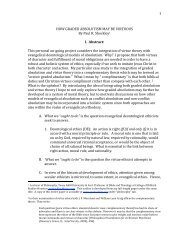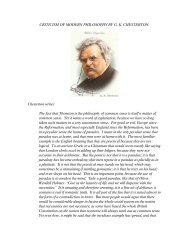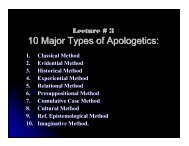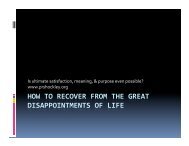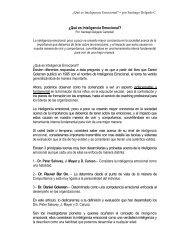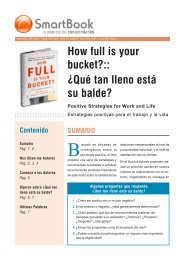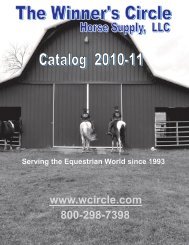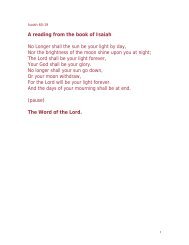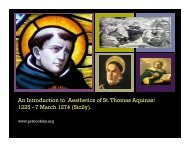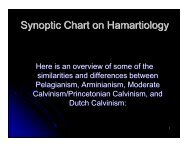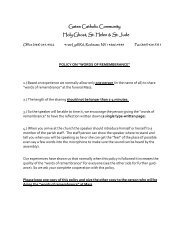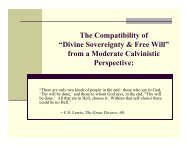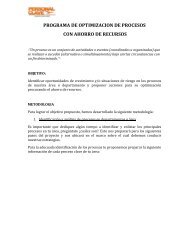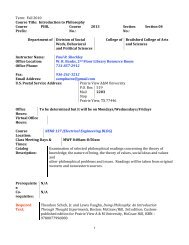- Page 1 and 2:
ReneDescartes1596-1650Caravaggio,
- Page 3 and 4:
Rene Descartes(1596-1650):When our
- Page 5 and 6:
I. Background:Educated at a Jesuit
- Page 7 and 8:
I. Background:1644 Descartes publis
- Page 9 and 10:
I. I. The Search for Intellectual C
- Page 11 and 12:
II. Descartes’ Goal:Lay the found
- Page 13 and 14:
Method: The Need for the Meditation
- Page 15 and 16:
Descartes’ Method:Knowledge Requi
- Page 17 and 18:
II. Descartes’ Plan:His ideal was
- Page 19 and 20:
C. Induction & Deduction:Descartes
- Page 21 and 22:
D. Rules of Method:Descartes’ met
- Page 23 and 24:
II.Descartes’ Method:Looking for
- Page 25 and 26:
Little emphasis on on sense experie
- Page 27 and 28:
First Meditation: Arguments forDoub
- Page 29 and 30:
Grounds of Doubt: First Meditation:
- Page 31 and 32:
III. Method:Method: It is a radical
- Page 33 and 34:
Consider the following statements b
- Page 35 and 36:
First Meditation:Withholding Policy
- Page 37 and 38:
V. The Order of Systematic Attack:C
- Page 39 and 40:
Objectors (2, 3, and 4 are the most
- Page 41 and 42:
1. Doubting Sense Perception:Someti
- Page 43 and 44:
2. Dreaming:Another ground of doubt
- Page 45 and 46:
2. Dreaming:No inspection of the co
- Page 47 and 48:
4. The Evil Deceiver:Can we be sure
- Page 49 and 50:
4. Evil Demon:Because of the evilde
- Page 51 and 52: Consider the following statements b
- Page 53 and 54: Meditation 2 Outline: Cogito: The N
- Page 55 and 56: Descartes’ Reasoning:Descartes th
- Page 57 and 58: What Descartes Establishes:Descarte
- Page 59 and 60: Meditation 2: Cogito:The Cogito:
- Page 61 and 62: Meditation 2: Problems with CogitoP
- Page 63 and 64: 2 ndndnd nd Meditation : : He disca
- Page 65 and 66: The Wax Passage:Transparency of the
- Page 67 and 68: Wax Wax Example Establishes Three P
- Page 69 and 70: Consider this important statement:
- Page 71 and 72: Descartes' Belief -Set:Believe only
- Page 73 and 74: Third Meditation: Descartes writes
- Page 75 and 76: Meditation 3: 3: SUMMARY OF INTRODU
- Page 77 and 78: Criterion of Certainty:At the begin
- Page 79 and 80: Third Meditation: What does “clea
- Page 81 and 82: Third Meditation: What does “Natu
- Page 83 and 84: Third Meditation: 3 Types of Ideas
- Page 85 and 86: Objective & Formal Reality:Meditati
- Page 87 and 88: Objective and Formal Reality:Object
- Page 89 and 90: Formal and Objective Reality:Everyt
- Page 91 and 92: More RealityThe reason why are infi
- Page 93 and 94: Scholastic GreatChain of Being:1. V
- Page 95 and 96: 2 nd Causal Argument for God’s ex
- Page 97 and 98: The Cartesian Circle:I am sure Gode
- Page 99 and 100: Descartes Response to Arnauld regar
- Page 101: Cartesian Circle:According to Dr. S
- Page 105 and 106: First & Second Meditation:Withholdi
- Page 107 and 108: Descartes: Mind-Body Problem:Descar
- Page 109 and 110: The Mind is is a Substance: A subst
- Page 111 and 112: Descartes' Knowledge-set at end of
- Page 113 and 114: Fourth Meditation: God is not a Dec
- Page 115 and 116: Fourth Meditation: God is not a Dec
- Page 117 and 118: God guarantees the truth of of all
- Page 119 and 120: This takes us back to Cartesian Cir
- Page 121 and 122: Meditation 4: The Possession of Fre
- Page 123 and 124: Descartes' Knowledge-set at end of
- Page 125 and 126: A. Considers what properties we can
- Page 127 and 128: C. 3 Objections to Ontological Argu
- Page 129 and 130: D. The Role of God in making Knowle
- Page 131 and 132: Descartes' Knowledge-set in Meditat
- Page 133 and 134: Meditation 6: The Problem ofExisten
- Page 135 and 136: AB. The Evidence for the existence
- Page 137 and 138: B. The Evidence for the existence o
- Page 139 and 140: Mind is really distinct from body:I
- Page 141 and 142: First Argument for Distinction ofMi
- Page 143 and 144: First Argument for Mind-BodyDistinc
- Page 145 and 146: Sense Impressions from BodilyObject
- Page 147 and 148: Do our senses tell us the truth abo
- Page 149 and 150: What is the relation of Mind and Bo
- Page 151 and 152: Mind-Body Interaction:Changes in th
- Page 153 and 154:
Descartes’ Difficulty with Intera
- Page 155 and 156:
Historical Solutions to the Mind-Bo
- Page 157 and 158:
Descartes' Knowledge-set at end of
- Page 159 and 160:
Descartes' Belief -Set:Believe only
- Page 161 and 162:
Various Objections:If we can’t be



